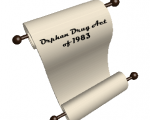
Purpose: to assist each child at the time of a seizure and when/if rescue medication administration is needed. Objectives: Upon completion of the rescue medication training, the participant(s) will demonstrate and/or verbalize the following competencies: Have a basic understanding of seizures and the different types and characteristics of each How to manage seizures Read medication […]




